Participants suggest more collaboration among Families of Parishes, communication with archdiocese key to success of mission
DETROIT — Priests, religious and laity from across the Archdiocese of Detroit gathered March 14 at Sacred Heart Major Seminary for a listening session connected to the global Synod on Synodality.
The table discussion among representatives from different Families of Parishes is part of the Archdiocese of Detroit’s participation in the global synodal process — which is set to reconvene in Rome this October — but also a continuation of the archdiocesan-wide Synod 16, which inspired Archbishop Allen H. Vigneron’s pastoral letter Unleash the Gospel.
Don't miss another story
Did you know you can get Detroit Catholic's latest daily or weekly articles delivered to your inbox? It's easy and free to sign up.
“What we are doing here tonight is not only contributing to the universal synod gathering, but also extending the reach of Synod 16," said Auxiliary Bishop Gerard W. Battersby, who led the discussions. "As we consult this very evening in this spirit, not only do we gather, but we operate under the mandate of the archbishop and all the fathers and mothers of the council that gathered on Washington Boulevard eight years ago.”
The evening began with a half-hour of Eucharistic adoration — tying the synod to the National Eucharistic Revival — in Sacred Heart’s chapel before participants gathered in the Bishop Gallagher Parlor for dinner and discussion.
Participants in the gathering were invited by the moderators of their Families of Parishes.
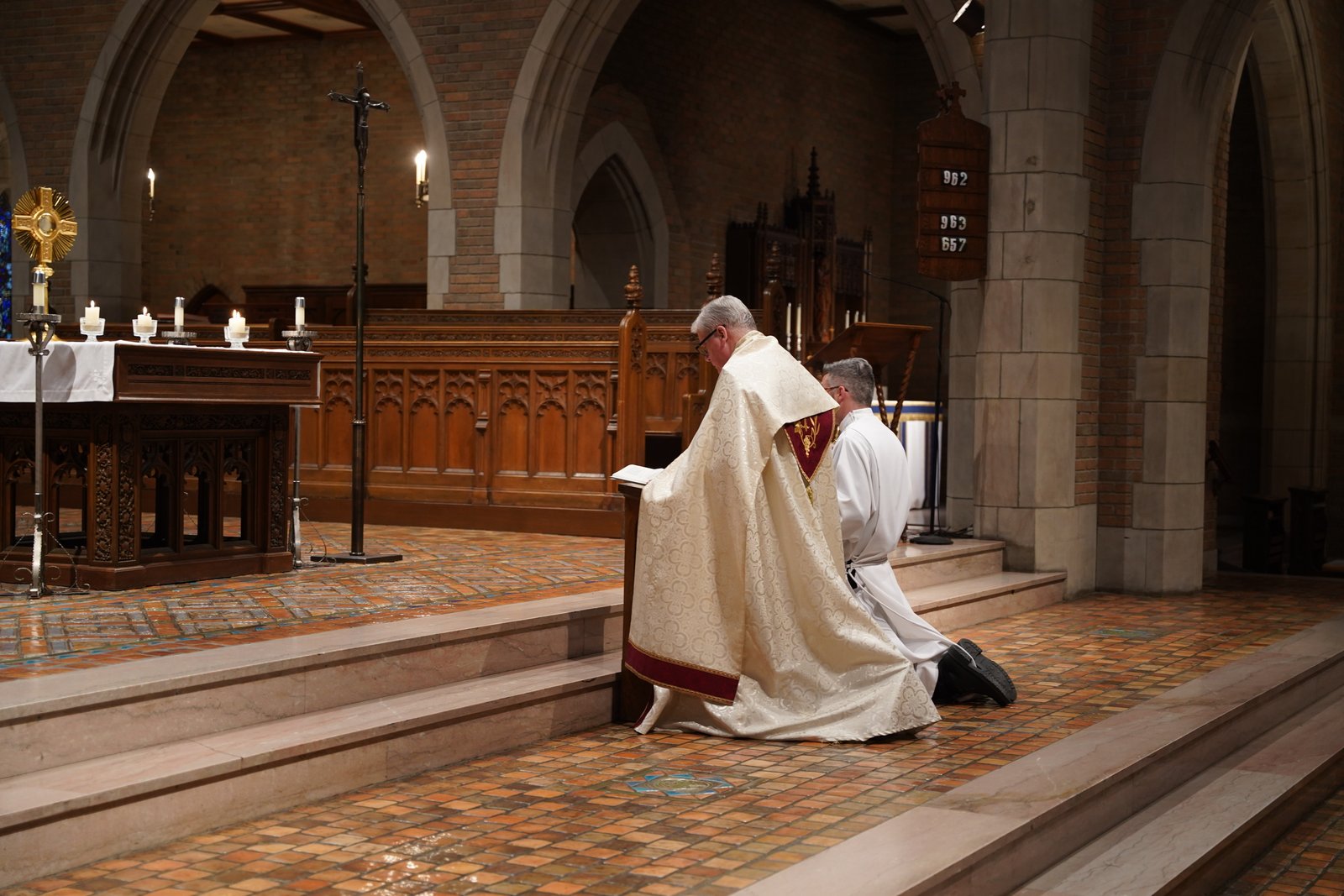
Bishop Battersby, who is serving as the point person for the Archdiocese of Detroit’s involvement in the global synod, conveyed his and Archbishop Vigneron’s gratitude to all the participants for their input and discernment and noted how the archdiocese’s synodal process has received praise from Cardinal Mario Grech, secretary general of the Synod of Bishops, as being in line with Pope Francis’ vision for a synodal church.
“The Archdiocese of Detroit’s synod participation has been shaped by our own experience of synodality, culminating in our Synod 16,” which took place Nov. 18-20, 2016, Bishop Battersby said. “It’s important to remember how the synod culminated in producing the document, ‘Unleash the Gospel,’ which was sent to Cardinal Grech, and Archbishop Vigneron received a letter back from him, extolling the virtues of the documents, saying it is the very thing the Holy Father intends for the entire world, that we have established in Unleash the Gospel thus far.”
Mary Henige of the Unleash the Gospel Pastoral Council was the main facilitator for the evening, providing instruction to the participants seated at the tables on discussing how the principles of Unleash the Gospel — going from maintenance to mission — have been implemented in their parishes, particularly after the launching of Families of Parishes.
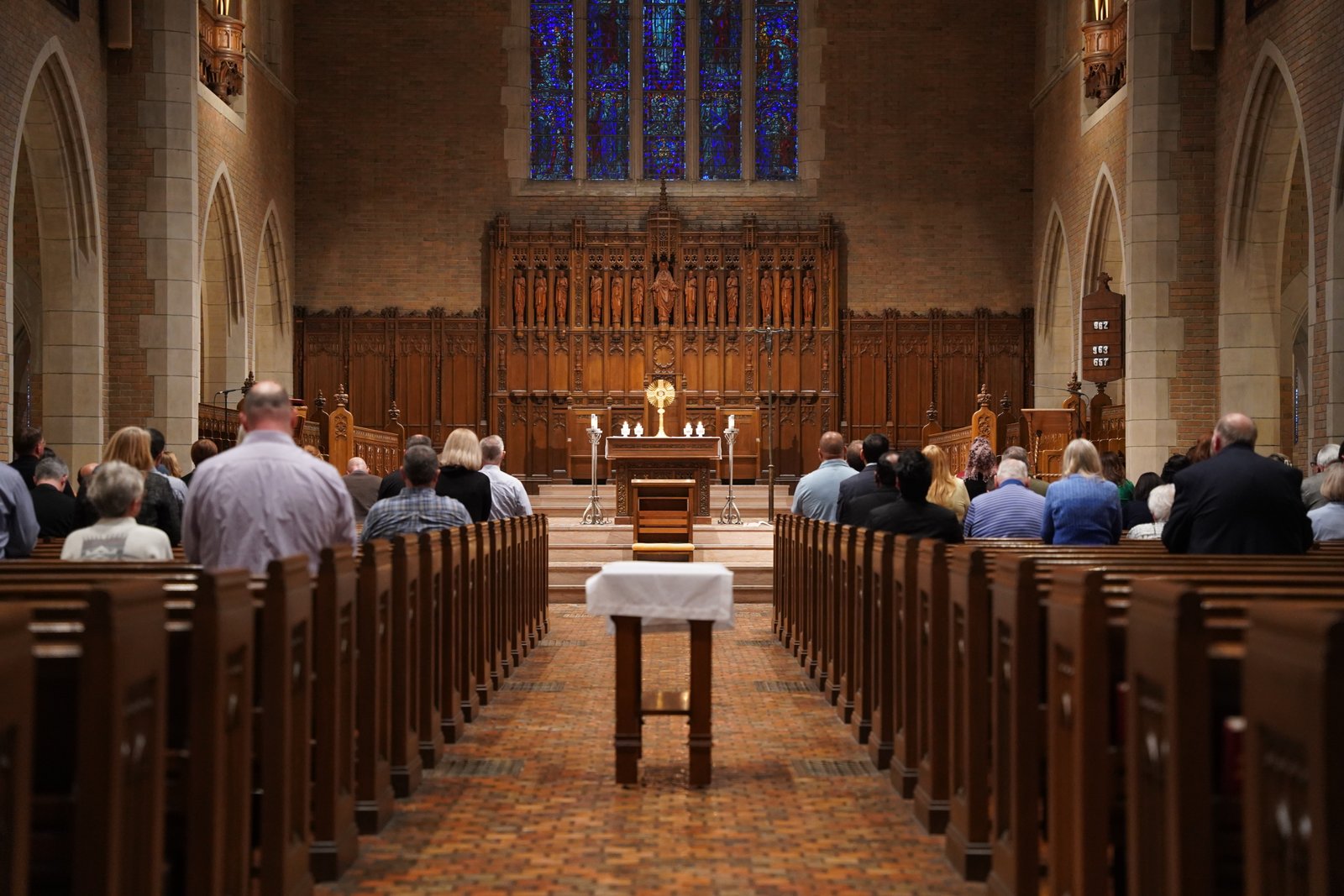
The discussion centered around Synod 16’s foundational conviction, that “the Church in the Archdiocese of Detroit is resolved to obey the Holy Spirit and be made by him a band of joyful missionary disciples. This means the Archdiocese, following the call of Pope Francis, is resolved to undergo a ‘missionary conversion,’ a change in our culture, such that every person at every level of the Church, through personal encounter with Jesus Christ, embraces his or her identity as a son or daughter of God and, in the power of the Holy Spirit, is formed and sent forth as a joyful missionary disciple.”
The table discussion focused on two questions:
- What commendations and recommendations do you have regarding our response in the Archdiocese of Detroit to this foundational conviction?
- In your experience, what commendations or recommendations can you identify regarding how the family structure helps us live out the foundational conviction?
“We are going to talk about accommodations and recommendations,” Henige said. “In the spirit of cooperation, there is a lot that is going on. We have daily frustrations about whether Families of Parishes is working, and whether we’re evangelizing to the best of our ability or not. But there is grace in the middle. Ten years ago, when the archbishop began this effort, we began with the Year of Prayer, which is why we started in the chapel tonight, to continue to beg the Holy Spirit for a fresh outpouring, a new Pentecost.”
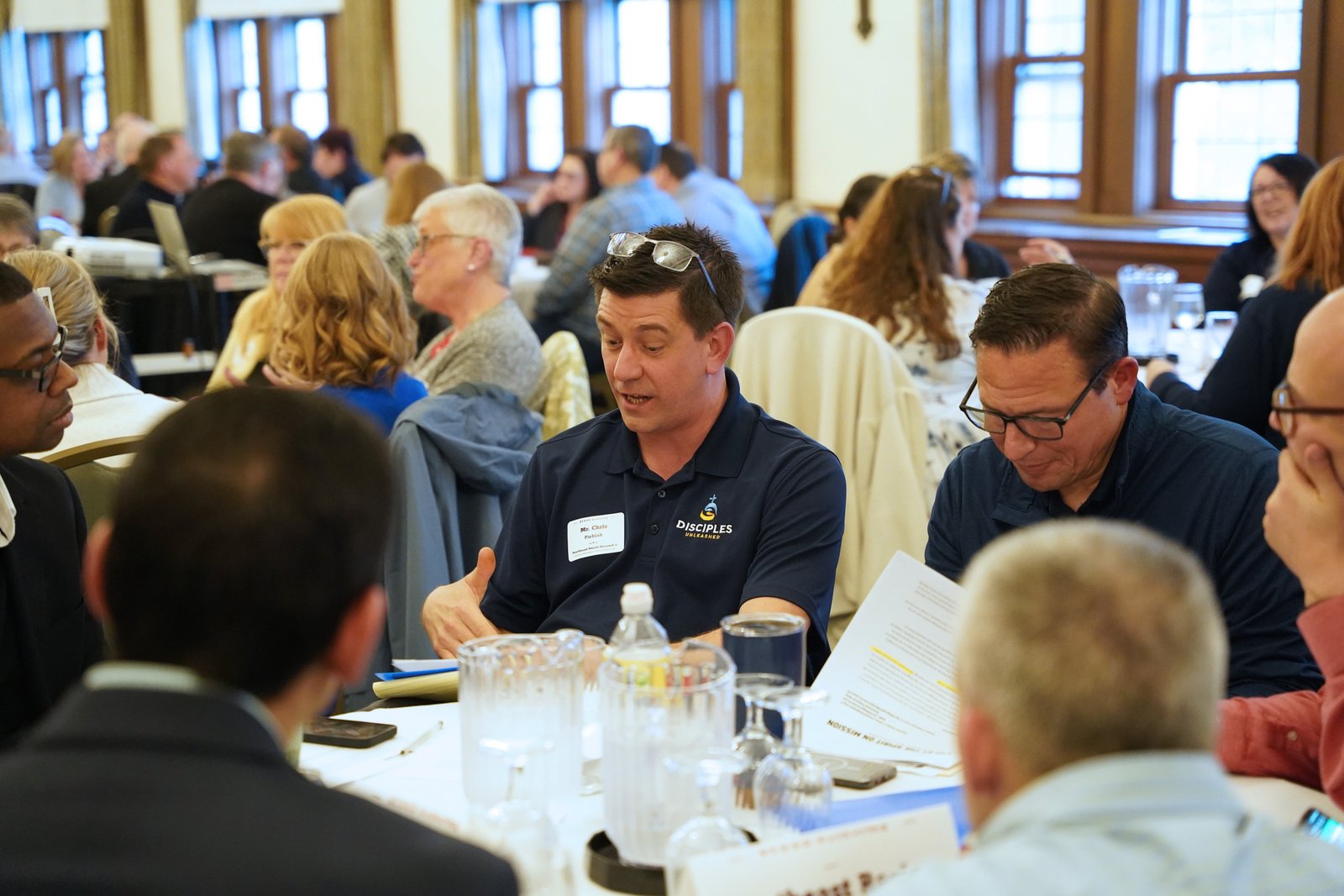
Henige encouraged participants to rekindle that spirit of praying for a New Pentecost when discussing what parishes need to do to better fulfill their evangelizing mission.
“The synod’s goal was nothing less than a radical overhaul of the Church in Detroit, a complete reversal of our focus from an inward, maintenance-focused Church, to an outward, mission-focused Church,” Henige said. “Those are fighting words: ‘radical overall, ‘complete reversal.’ And I’m sure some days in your parishes and families, you feel like, ‘Yes, and can we go back?’ But that is where God is calling us.”
Marilyn Webb served as a table moderator for a Northwest Region group and reported the parishes at her table already are collaborating with programs like Vacation Bible School, but would appreciate more contact between the Archdiocese of Detroit’s Chancery and the Families of Parishes, particularly between the priests and bishops.
“Our table understands at one time the regional bishop was meeting with the moderators and the priests, but not sure if that is still taking place,” Webb said. “Some parishes did not have a representative or the opportunity to have a representative from the AOD to come talk to their parishes, so they have no idea on why they are doing this.”
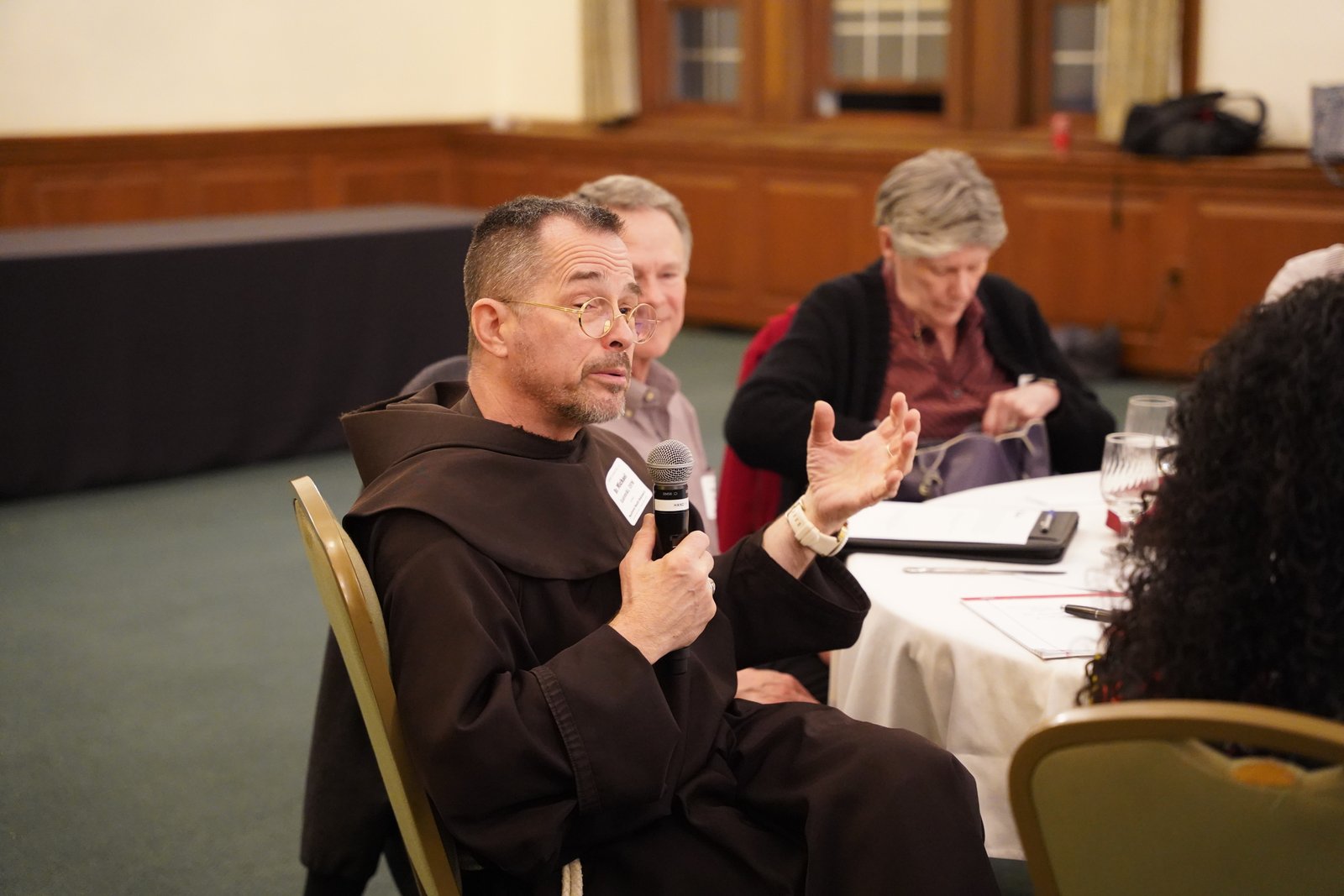
Bro. Michael Radomski, OFM, of the Duns Scotus Friary in Berkley, spoke from his Northwest Region table about how Archbishop Vigneron wrote in Unleash the Gospel that many priests live alone and are feeling isolated and noted how living in a religious community has spiritually fed the friars with camaraderie.
“The archbishop’s letter stated that our priests don’t live together, and I think that is a terrible loss,” Bro. Radomski said. “If our priests are to grow in holiness and spiritual depth, they need to commiserate with each other. They need to be able to pray with each other, to live together with each other. If they can do that, they can grow in one mind and spirit around this whole concept of Family of Parishes.”
Henige asked the listening session participants to think of ways in which parishes and Families of Parishes can reach out and evangelize, to focus more on mission over maintenance.
“The new evangelization cannot be accomplished from within the walls of our Church,” Henige said. “We know that. We know that it is really hard work. Learning what’s working and what’s not is going to help Families of Parishes. In Unleash the Gospel, Archbishop Vigneron wrote, ‘Jesus Himself did not remain in the synagogues, where there were already devout people.’ Having a missionary mindset requires a willingness to try new things, even if it leads to failure at times, to advance the Gospel.”
Janet Diaz was the facilitator for a Central Region table that featured a variety of churches from the city of Detroit, including more traditional parishes, Hispanic parishes and Jesuit-sponsored parishes.
Despite their differences, the group discussed common successes in evangelizing their communities and ways they can better collaborate to make their parishes more welcoming.
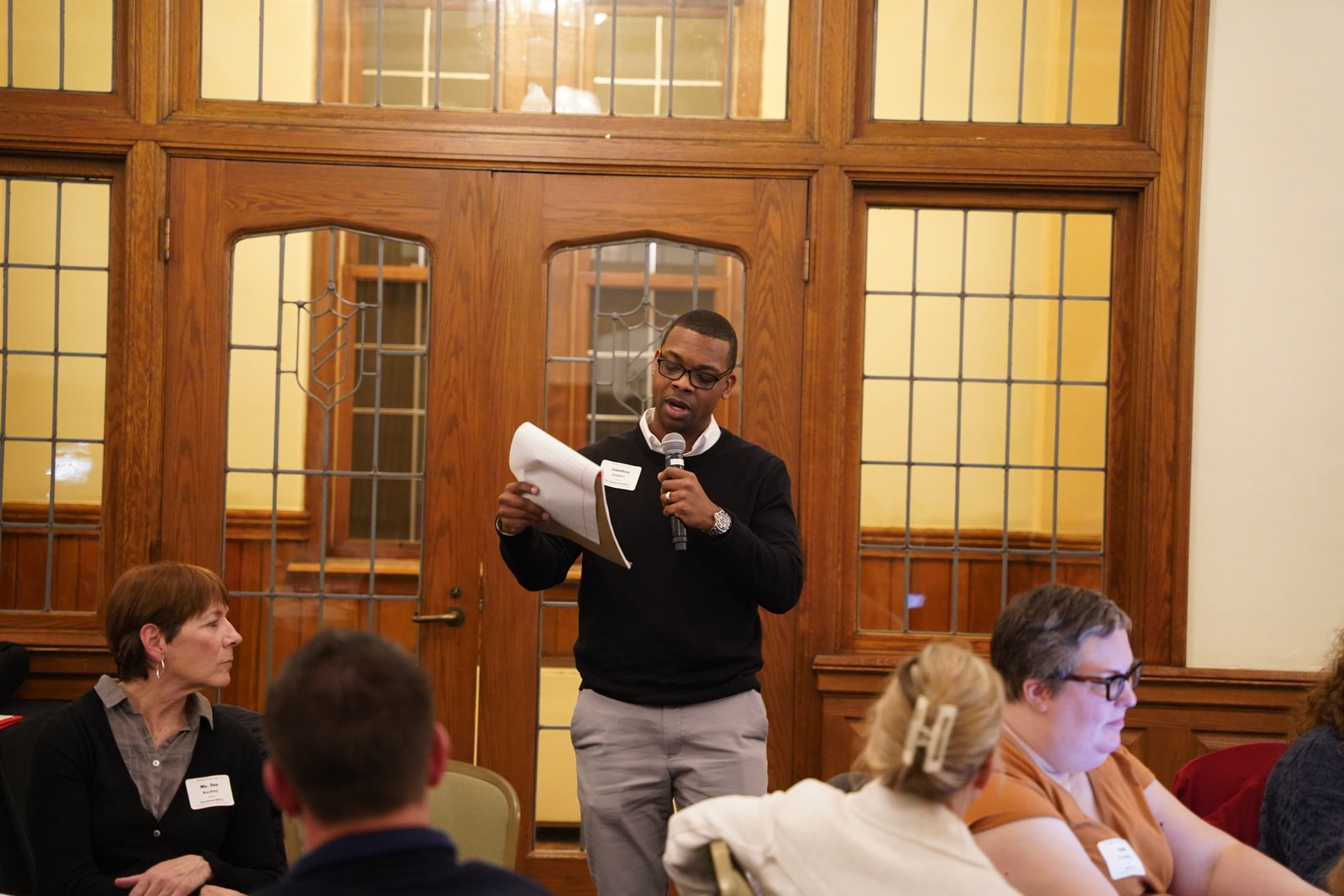
“The immigrant communities represented here — the Hispanic communities represented by Holy Redeemer and St. Gabriel — they have seen a lot of progress in trying to attract more men to grow in leadership and spiritual leadership in their families and community,” Diaz said. “They have taken that as a real challenge and have seen real progress with that.”
Diaz also highlighted the work of Gesu and SS. Peter and Paul (Jesuit) parishes in Detroit for their sustainability initiatives, which have saved each parish money on stormwater fees and served as fruitful ground for evangelizing by reaching out to non-parishioners interested in ecology.
“As part of the green teams at SS. Peter and Paul and Gesu, they have saved the parish a lot of money very intentionally through the moral obligation for sustainability, and they have found this as an opportunity for evangelization, with people coming to SS. Peter and Paul and Gesu, because they see the environmental work they are doing there,” Diaz said.
The entire night was a chance for parishioners and clergy alike to take a pulse on where their parishes and Families of Parishes are in terms of progress toward a more missionary Church, in line with the precepts of Unleash the Gospel and a Church that reaches out to the people — or, as Pope Francis puts it, is a field hospital for souls.
“We, my brothers and sisters, are resolved to undergo a missionary conversion, a conversion that is one of a generation, a new way of looking at the world and engaging with the world,” Bishop Battersby said. “Not so much simply as a person whom circumstances act upon, but as agents of faith who seek to share the mission of Jesus Christ.
"It is this atmosphere in which we gather this evening; that is the very oxygen which fuels our missionary pivot. It must be the expression, exemplary of our own synodal process, most particularly reaping the fruits of Synod 16.”
Copy Permalink
Archdiocese of Detroit












